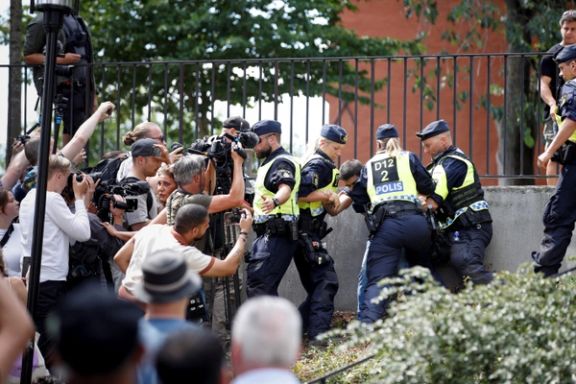Sweden accuses Iran's IRGC of hacking text service to incite against Quran burnings

Swedish authorities said on Tuesday that Iran hacked a messaging service last year, sending thousands of messages urging Swedes to retaliate against Quran burners.

Swedish authorities said on Tuesday that Iran hacked a messaging service last year, sending thousands of messages urging Swedes to retaliate against Quran burners.
Last year, there were several instances in Sweden where Islam's holy book was publicly burned, triggering widespread outrage across the Muslim world and sparking concerns of potential jihadist attacks.
“The security police can establish that a cyber group acted on behalf of the Iranian Revolutionary Guard to carry out an influence campaign,” the Swedish Security Service stated.
“The purpose was, among other things, to paint the image of Sweden as an Islamophobic country and create division in society,” it added.
In a separate statement, the Swedish Prosecution Authority confirmed that its investigation had determined the Iranian state, through the Iranian Islamic Revolutionary Guard Corps, was responsible for the data breach.
The authority noted that while they had identified the hackers involved, they would not proceed with pressing charges.
“Since the perpetrators are acting for a foreign power, in this case Iran, we assess that the conditions for prosecution abroad or extradition to Sweden are lacking,” the statement read.
Last year, the US State Department named Iran as the world's number one state sponsor of terror.
Following the Quran burnings, Sweden heightened its terrorism alert last year. The desecration led to widespread protests across several Muslim-majority countries, including a large demonstration outside the Swedish embassy in Baghdad. Iran's foreign ministry summoned Sweden’s charge d’affaires in Tehran. Also, Morocco recalled its ambassador in protest. At the same time, Turkey’s foreign minister condemned the incident, stating that it is “unacceptable to allow anti-Islam protests in the name of freedom of expression.”
The US also weighed in on the matter, with the deputy spokesperson for the State Department, Vedant Patel, noting in a briefing that burning religious texts is “disrespectful and hurtful.” He added, “What might be legal is certainly not necessarily appropriate".
In May, Sweden’s domestic security agency revealed that Iran had been planning terror plots in Sweden targeting dissidents and the country's Jewish and Israeli community.
The Swedish Ministry of Foreign Affairs said the revelations showing Iran was using Swedish crime gangs were being taken "very seriously".
In June, Iran and Sweden exchanged prisoners in a controversial swap. Iran freed Johan Floderus, a Swedish diplomat, and Saeed Azizi, a dual citizen. In return, Sweden released Hamid Nouri, an Iranian official convicted of war crimes for his role in the 1988 mass executions. Human rights groups have strongly criticized the exchange, calling it an act of "hostage-taking" by Iran.